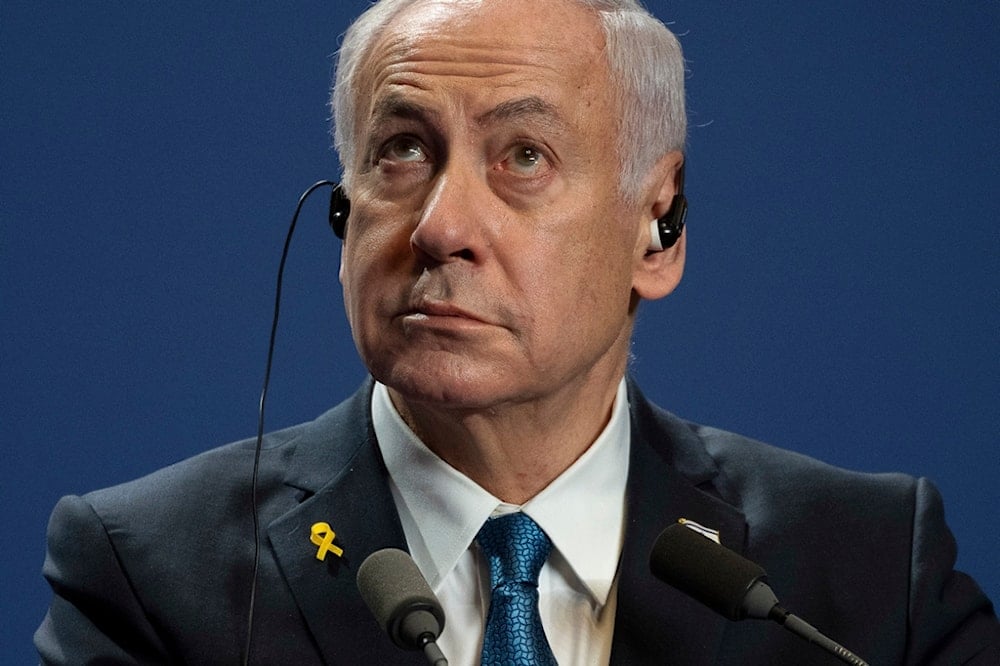Under US pressure, Netanyahu allows limited Gaza aid, bypasses cabinet
Facing US pressure, Netanyahu ordered immediate Gaza aid entry without a cabinet vote, fearing opposition. Far-right ministers voiced dissent but were overruled.
-

Israeli Prime Minister Benjamin Netanyahu looks up during a press statement at the Carmelite Monastery in the Buda Castle in Budapest, Hungary, April 3, 2025. (AP)
Israeli Prime Minister Benjamin Netanyahu announced Sunday evening the limited and immediate entry of humanitarian aid into the Gaza Strip, a decision made amid intensifying pressure from the United States and mounting international criticism over widespread famine in the besieged territory.
The announcement was delivered during a meeting of the Israeli occupation’s security cabinet but was made without a formal vote, a move reportedly aimed at avoiding a likely failure to secure majority approval within the far-right-dominated forum.
According to Israeli media, the meeting was promptly adjourned after Netanyahu made the declaration. Although ministers voiced their positions, no vote was held. Far-right National Security Minister Itamar Ben-Gvir demanded a vote on the decision, but his request was denied.
Following the announcement, Netanyahu, Government Secretary Yossi Fuchs, and Chief of Staff Eyal Zamir abruptly exited the meeting. The military had presented an operational report, and ministers were allowed brief commentary before the session was sealed off.
'You are rebelling'
When Ben-Gvir reiterated his demand for a vote, National Security Council head Tzachi Hanegbi sharply rebuked him, reportedly stating, “You are rebelling.”
The decision comes as international outcry intensifies over the humanitarian catastrophe in Gaza, where over a million Palestinians face starvation under a blockade enforced by the Israeli occupation for months. Washington has reportedly made direct appeals to Netanyahu’s office to facilitate immediate aid access, warning of deteriorating diplomatic fallout.
Legal scholars are raising concerns that the continued restriction of aid may constitute a war crime. Janina Dill, co-director of the Oxford Institute for Ethics, Law and Armed Conflict, told The New York Times, “Enforcing a military blockade with the knowledge that it will starve the civilian population is a violation of international law.”
Dill added that if Israeli leaders acknowledge that the blockade is meant to force political and military concessions, “it clearly constitutes a war crime.”
Specialist officers from COGAT, the "Israeli" agency managing aid into Gaza, have privately agreed with aid groups’ assessments, confirming to The New York Times that many in the enclave are just weeks away from starvation. Their internal updates rely on real-time reports from Gaza, including humanitarian inventories, aid truck contents, and contact with residents.
UN, aid agencies warn of imminent famine
The United Nations has reinforced these concerns. On Monday, the Integrated Food Security Phase Classification, a UN-backed mechanism, declared that famine was imminent in Gaza. The report warned that if "Israel" proceeds with its planned military escalation, “the vast majority of people in the Gaza Strip would not have access to food, water, shelter, and medicine.”
Most bakeries have closed, charity kitchens are shutting down, and the World Food Programme has already exhausted its food stocks.
As The New York Times detailed, the Trump administration is working with "Israel" on a plan to resume limited aid distribution via private organizations at centralized hubs inside Gaza. These sites, each expected to serve hundreds of thousands of people, would be surrounded by Israeli military and patrolled internally by private security.
But the UN Office for the Coordination of Humanitarian Affairs rejected the plan, warning it would put civilians at greater risk by forcing them to traverse longer distances through potentially dangerous zones. According to UN agencies, the proposal “drastically reduces operational reach,” shrinking the number of distribution points from 400 to just a few.

 4 Min Read
4 Min Read










